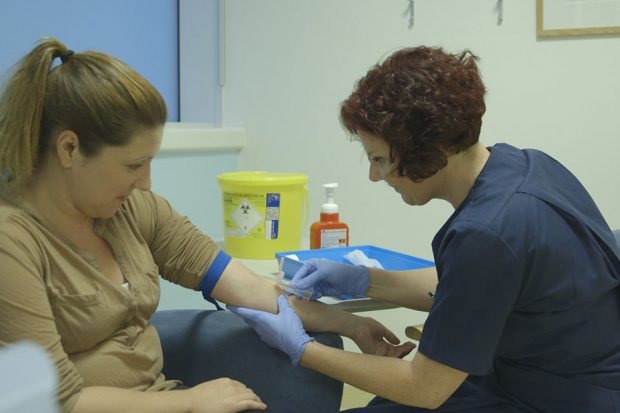
On 1 June 2021, following a positive UK NSC recommendation, non-invasive prenatal testing (NIPT) was added to the existing NHS screening programme for Down’s syndrome, Edwards’ syndrome and Patau’s syndrome in England.
The NIPT blood test is a second screening test offered to pregnant women whose initial combined or quadruple screening test result shows that their chance of having a baby with one of these 3 conditions is greater than 1 in 150.
This means women who receive a higher chance result from a combined or quadruple test can choose one of 3 options:
- no further testing
- NIPT
- prenatal diagnosis (PND)
Jane Fisher, Director – Antenatal Results and Choices (ARC):
We know from calls to our helpline that women value the opportunity to choose NIPT after a higher chance result from combined or quadruple screening. Though the risk of miscarriage from prenatal diagnostic procedures is small, it is always significant to expectant parents. For many women NIPT offers a safe way to gain more information.
The NHS started this evaluation despite facing many challenges brought about by the COVID-19 pandemic.
The evaluation is working well due to the sheer dedication and commitment of midwives, antenatal screening coordinators and the genomic laboratories. We want to say a huge thank you for their hard work.
Elizabeth Young, Principal Clinical Scientist – Birmingham Women's Hospital, Central and South Genomic Laboratory Hub:
It is fantastic working closely with our maternity colleagues on this evaluative rollout. Our timely delivery of NIPT results has only been possible due to the close working relationships we have with the midwives and antenatal screening coordinators.
Initial results
The National Congenital Anomaly and Rare Disease Registration Service (NCARDRS) was set up in 2015 and collects data on congenital anomalies across England. NCARDRS supports the evaluative roll out of NIPT by collecting data from the biochemistry screening laboratories on combined and quadruple tests.
Between 1 June 2021 and 30 September 2022 nearly 15,000 NIPT samples were tested across the 3 NIPT screening laboratories. About a fifth of NIPT tests followed a higher chance quadruple test and the rest followed a higher chance combined test result.
A result was reported for 96% of these 15,000 samples. 86% of NIPT results were reported within 5 days. 7% of NIPT samples tested were reported as higher chance results for one or more of the 3 conditions.
We also collect data directly from maternity services. Data so far shows:
- around three quarters of the women with a higher chance combined or quadruple test chose to have a NIPT screening test and
- 97% of women with a higher chance or a no result NIPT result attended an appointment within 3 days to discuss their results.
Elsa Moro, Antenatal and Newborn screening coordinator – Guys & St Thomas’ NHS Foundation Trust:
The introduction of NIPT to the NHS FASP pathway has been positively welcomed by staff and pregnant women. It has helped us massively in reducing inequalities, making it accessible to all eligible women regardless of their background. It has also reduced the number of invasive tests meaning that fewer women are exposed to a risk of miscarriage.
e-learning and other resources
We would like to encourage all healthcare professionals who are involved in the offer of screening for Down’s syndrome, Edwards’ syndrome and Patau’s syndrome in England to complete the ‘NIPT – evaluative rollout’ e-learning resource. In addition, we would ask screening coordinators to continue to use the higher chance information and resources.
Please refer to the:
- NIPT e-learning resources
- specific information for women about their options following a higher chance combined or quadruple test
See also the operational guidance for healthcare professionals supporting the offer of NIPT
UK NSC blog
The UK NSC blog provides up to date news from the UK NSC. You can register to receive updates direct to your inbox, so there’s no need to keep checking for new articles. If you have any questions about this blog article, or about the work of the UK NSC, please email screeninginformation@dhsc.gov.uk.